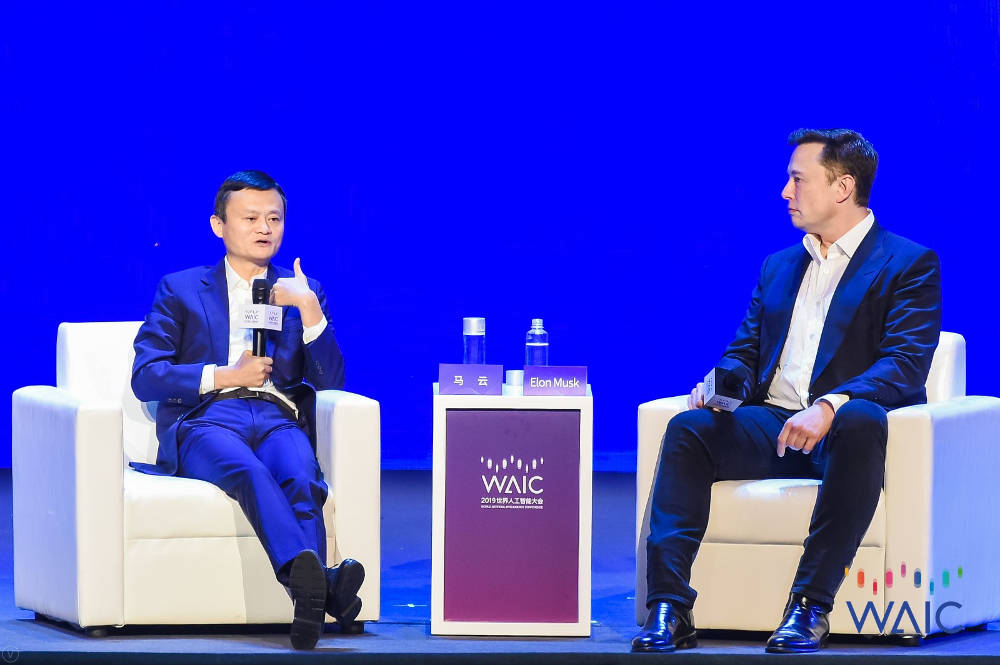[Alibaba founder Jack Ma and Tesla’s Elon Musk at the 2019 World AI Conference held in Shanghai. AI is a significant area of focus in Beijing's made in China 2025 plan. China has started engaging the larger world by organising events like these to boost AI co-operation and innovation. Photo from WAIC]
Every time I visit China, I am surprised by how fast it’s changing. I first went to the country as a student nearly two decades ago. Over the years, as a researcher and a teacher, I have had several opportunities to go back. Every time I see signs of dizzying change from the previous visit. The pace should come as no surprise. An old joke goes, the only intellectual property the Chinese believe in is speed.
Last month, I took about a dozen students from my B-school, IIM-Indore, on a week-long immersion programme to Shanghai. Shanghai is often referred to as New York on steroids, thanks to the growing number of skyscrapers and its boundless energy. It’s also the place to go to get a crash course on the changes that are sweeping the country.
My recent educational tour—which included industry visits, interactions with management schools and conversations with business leaders—impressed upon me the scale of change and its consequences in three critical areas: environmental regulation, technological innovation, and corporate social responsibility.
These domains are also symbolic of a fundamental shift in Chinese thought about the very goals of economic development. Earlier, the purpose was merely economic modernisation. Today, the focus is on exploiting the benefits of economic modernisation to redefine the goals of the society.
It’s important for business leaders to take note of these changes. In both China and India local cultural norms governing interpersonal transactions, and social networks play a determinative role in business operations. And many Indians look at China’s transformation with great admiration. The immersion gives some pointers on what to learn from the China story—good and bad.
The policy, counter-policy and pollution
Many tend to associate environmental governance in China with authoritarian environmentalism, in which the state plays a dominant role in decision-making and implementation. However, the truth is more nuanced. In China, typically, the central government makes policies and prescribes instruments, whereas the provinces are required to implement the strategies. Local governments have the autonomy to choose appropriate devices based on regional and local factors. Provincial governments can select and prioritise a specific set of policies laid down by the centre.
There is a Chinese saying which goes Shang you Zhengce Xia you Duice (the centre has a policy, whereas the local governments have a counter-policy). This kind of in-built flexibility leaves a lot of manoeuvring space to promote or postpone policy directives from the centre. This system has inspired leadership at the local level to not only talk about economic modernisation, but take significant initiatives in improving the overall quality of life of its citizens.
Shanghai is a case in point. As recently as 2013, this megalopolis was facing a seemingly insurmountable crisis due to the deterioration of its air quality. The response of the Shanghai local government has made it a star performer in devising and implementing environmental regulation. Since announcing ambitious targets to reduce air pollutants in 2017, the extraordinary measures taken by the local government have begun yielding promising results. Based on its current trajectory, its goal of turning Shanghai into an eco-friendly metropolis and an excellent global city by 2035 is highly likely to be achieved.
Declaring war on pollution in 2014, the Shanghai clean air action plan was launched. The plan proved to be one of the most remarkable feats of environmental regulation anywhere in the world. The programme imposed harsh personal penalties on polluting vehicles. Shanghai introduced ‘China's strictest air protection law’, with maximum fines of 500,000 yuan. Company bosses faced individual penalties of up to 100,000 yuan under the law. Also, the Shanghai government has started providing subsidies to incentivise the purchase of ‘green’ cars that run on renewable energy. In July 2019, a waste management plan was announced by the mayor of Shanghai, Ying Yong. This plan includes
- the introduction of a new garbage classification system
- restricted use by businesses of disposable items, and
- spearheading construction of ten renewable recycling centers in Shanghai by the end of 2019.
In this case, the state has decided to lead by example: government and public institutions are to be subjected to tighter restrictions than others.
During our visit to the New Development Bank, the BRICS bank president KV Kamath shared some major initiatives to make Shanghai pollution free. The various measures include meticulous planning to deal with waste management practice. As a result, there has been a two-fold increase in the capacity to treat waste. He shared how the waste is moved in barges after it is baked and sealed in incineration plants after being subjected to chemical treatment. Additional measures to improve air quality include promoting last mile connectivity by wide-scale application of technology where bikes can be used by anyone based on cloud-based technologies. Furthermore, the local government is actively promoting greenery. For instance, flower beds are changed every four months to not only add aesthetic value, but also promote biodiversity.
Artificial Intelligence, innovation the new buzzwords
This scene from popular television series Silicon Valley doesn’t capture what is happening on the ground in China today.
With an increasing emphasis on innovation (Chuang Xin), China has been trying hard to shed its image of a violator of copyright and patents held by Western firms and technology companies. It’s bearing fruits.
Western business models no longer get automatic deference among Chinese entrepreneurs. Instead, aided by the state, its technology entrepreneurs have begun to view themselves as viable competitors against their more celebrated American counterparts in the fields of mobile technology, AI, and robotics.
For example, the Chinese firm Huawei has invested in breakthrough mathematical research in ‘polar codes’ to develop 5G data transmission to compete with its American counterparts who have developed the LDPC technology (low-density-parity-check). At 48%, the Chinese share of the total equity funding in AI startups is now the largest in the world. Indigenous technological firms such as Baidu, Alibaba, Tencent (collectively called BAT) and iFlyTek are classified as national champions by the central government to lead various innovation platforms in the field of autonomous vehicles, smart cities, and face recognition technology. In addition, the Chinese phrase Shang Chang ru Zhan Chang, which is loosely translated as ‘the world of business is like a war’, animates the dominant attitudes of the new entrants in these sectors.
One of the significant areas of focus in Beijing's made in China 2025 is a sharp focus on AI. In 2017, China came out with its plans in a document titled Next Generation Artificial Intelligence Development Plan. According to the programme, China wants to keep pace with AI technology by 2020, achieve significant milestones by 2025 and establish itself as the world leader by 2030.
China has also started engaging the larger world by organising events like the world AI Conference in Shanghai to boost AI co-operation and innovation globally. The theme for this year's conference was Intelligent Connectivity, Infinite Possibilities. The idea is to engage the international community to develop new tools to address issues like environmental protection and public health via AI.
Corporate ‘political responsibility’
During one of our industrial visits, we were discussing the topic of corporate social responsibility with a faculty member of one of the leading management schools in China. At one point, he looked at us and said, in China, corporate social responsibility includes ‘political responsibility’.
In China, the phrase ‘political responsibility’ means two things. For anyone doing business in China, whether domestic or foreign players, the nation comes first. Second, political responsibility also entails an unquestioned commitment to ‘made in China’ rules. This commitment amounts to refraining from any form of deceitful activities as regards their products and services.
In the recent past, the government has been very hard on businesses which have compromised on quality standards. Companies are supposed to ensure not fostering relationships with careless suppliers. China has not hesitated to use official platforms and sentiments to punish companies for real or perceived transgressions, leading the corporates to apologise for ‘hurting the feelings of the Chinese people’. Even domestic companies have been on the firing line. In 2019 two Chinese companies were under the scanner. One incurred the wrath of the authorities for turning medical waste such as plastic syringes into toys and bags. Another faced the music for violating consumer privacy with machines making up to 5,000 nuisance calls a day.
Firms cannot deviate too far from the current Chinese definition of economic nationalism and value systems. The priority on quality control, especially in sectors having a direct bearing on people's health, is a crucial feature of China’s domestic business regulation. The world consumer rights day on March 15 each year is taken as an opportunity when errant business enterprises—often multinationals—are shamed by the China Global Television Network (CGTN, previously called CCTV).
Major brand names have come under the Chinese official media scanner in this process: Apple was accused of providing inferior post-sales service to mainland customers, faulty gearboxes became the cause of problems facing Jaguar, Nike for its advertisements claiming 'zoom air' sole cushions, and Volkswagen for engine defects in its Touareg SUV. Mercedes found itself in hot water for using a quotation from the Dalai Lama in its advertisements. A McDonald’s TV commercial that depicted a Chinese man kneeling before an electronics salesman and begging for a discount also provoked much negative feedback. In fact, in the recent past companies, especially big MNCs, are investing a lot in their PR exercises to avoid such situations.
In the last one year or so new dimensions have been added to ‘political responsibility’. MNCs are required to accept the terms and conditions of ‘one China’. The Sino-US trade war and the Hong Kong protests have broadened the scope of political responsibility. To cite an example, one of Huawei's suppliers Menpad, a Shenzhen-based LCD maker, came up with a unique way of fulfilling its political responsibility. It decided to punish any employee that buys an Apple iPhone by firing them. Furthermore, it announced a 15% subsidy for those who would buy a ZTE or Huawei phone. Menpad was inspired to show this solidarity with Huawei during the escalation of the trade war with the US. In September 2019, JP Morgan told its employees to ensure they don’t refer to Hong Kong, Macau SAR, and Taiwan as separate countries. Cathay Pacific’s CEO had to resign for refusing to share the names of employees who had participated in the Hong Kong protests.
Learning from China
During the one-week educational tour, what was striking was that everyone has a very different take on China. Their insights were profound and refreshing. Each of these perspectives highlighted the various dimensions of the China story. The idea is not to glorify or denigrate the Chinese way of doing things. Like any other story, there are strengths, and there are shortcomings. The China story is no different in this regard. What is of immense relevance for us is a nuanced and informed understanding of each of these perspectives. This understanding is very critical for not only a country like India, but any other developing country seeking economic modernisation.
Such an exercise will have a two-fold benefit. One, we can adopt some of the best practices in China. And second, we can avoid the pitfalls of speed and scale. Irrespective of our learnings from China, there is no escaping making sincere attempts to understand and critically examine the China story. For, in comparing ourselves with them, we are bound to introspect and get inspired to draw from our strengths. And reinforce our beliefs in what we do best and address our weaknesses.



